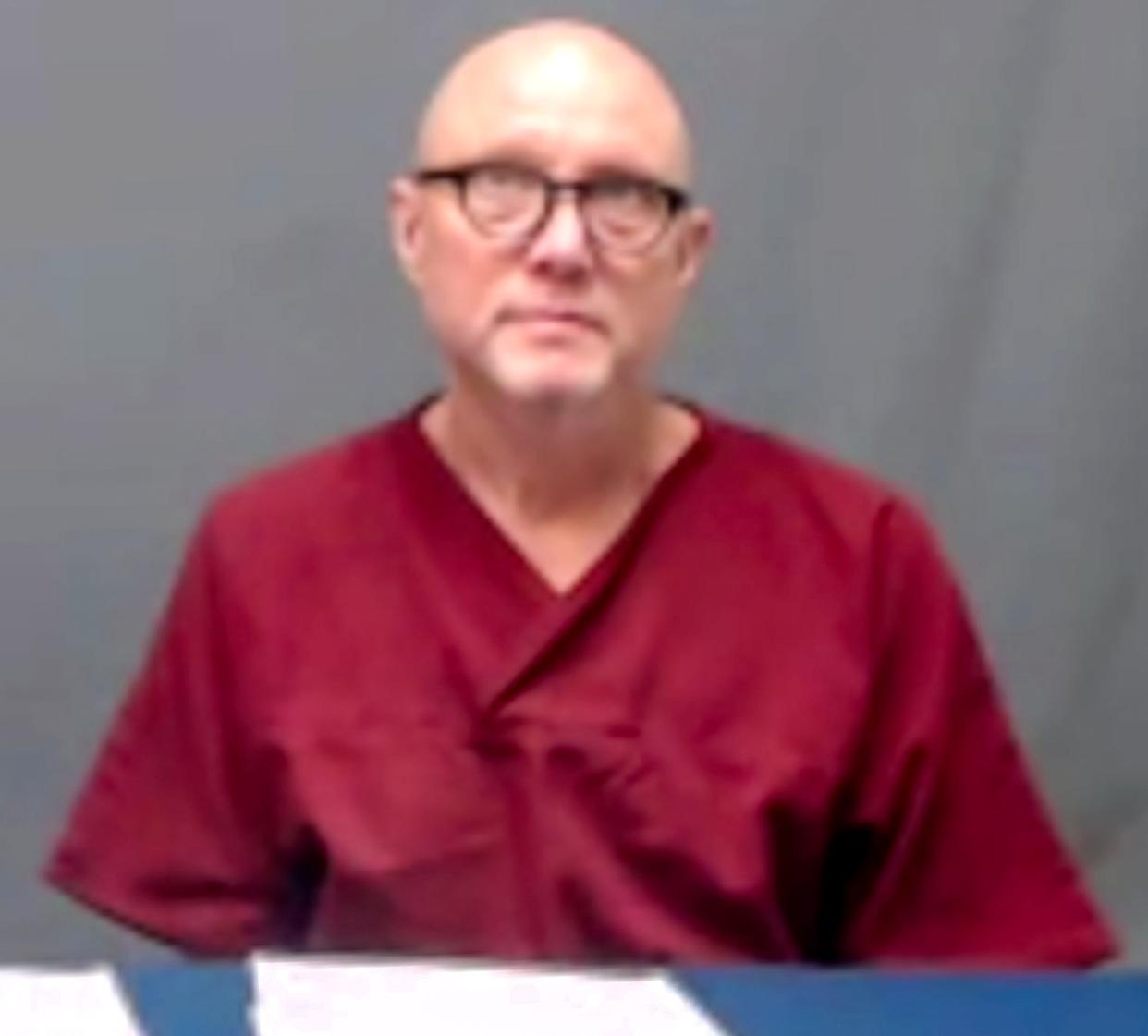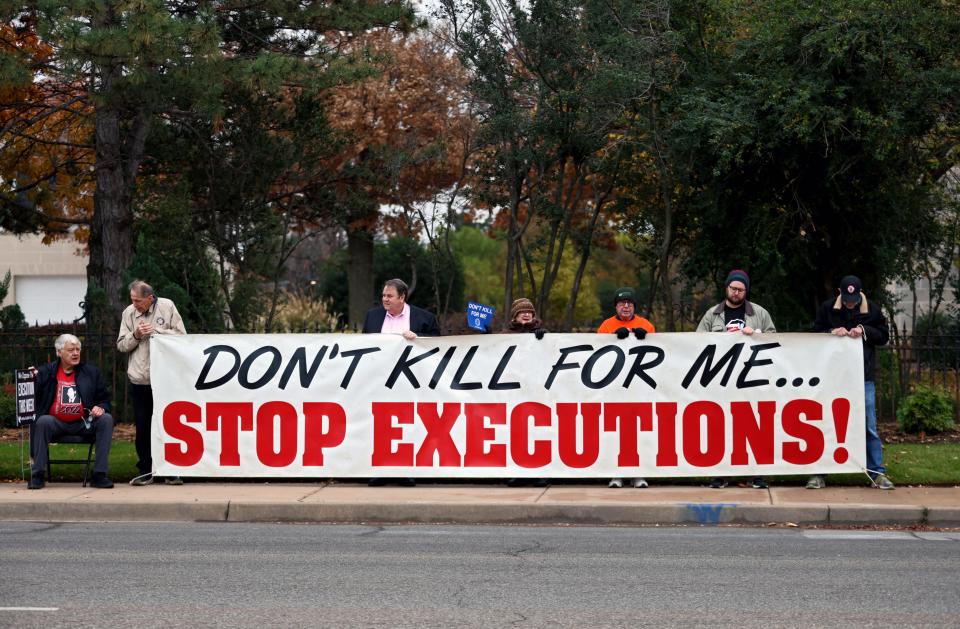Oklahoma executes man in double murders despite parole board recommendation for clemency

- Oops!Something went wrong.Please try again later.
McALESTER, Okla. – An Oklahoma man was executed on Thursday for a 2001 double murder, despite his claims he acted in self-defense and a parole board's recommendation he be granted clemency.
Phillip Dean Hancock, 59, was sentenced to death for fatally shooting Robert Lee Jett Jr. and James Vincent "J.V." Lynch in Oklahoma City. He was pronounced dead at 11:29 a.m. local time after lethal injection after Gov. Kevin Stitt, a Republican, did not intervene to commute his sentence to life in prison without parole.
The execution was set to begin at 10 a.m. It did not start on time because the Oklahoma Department of Corrections was waiting on a decision from the governor.
It was the state's 11th execution since lethal injections resumed two years ago, after a yearslong pause because of problems with lethal injections.
What happened in the shooting? Why Hancock claimed self-defense
Hancock acknowledged that he killed the men, but maintained he did so out of self-defense after he was attacked by them on April 27, 2001, at Jett's home.
Not in dispute in the case was that Jett ordered Hancock to get into a cage while wielding a metal bar, a witness said. They had consumed methamphetamine and had a disagreement about a pack of cigarettes.
Hancock told the Oklahoma Pardon and Parole Board that Jett was bludgeoning him with a metal tool while Lynch, 57, held him down in an armbar chokehold. He said he shot the men after getting control of Jett's pistol.
"I was in a life-or-death situation," Hancock told the board via a video link from prison. "They forced me to fight for my life."
"I absolutely regret, with all of my heart, that those men died as a result of the nightmare situation that they themselves created," he said. "I did what I had to do to save my life."
Attorneys for the state argued that the "standoff ended just as quickly as it had begun" in a written statement to the parole board, adding that Jett had walked away and Hancock went after him. They also pointed to testimony from a witness who said Hancock shot Jett a final time in the backyard. "I'm going to die," Jett said, according to the eyewitness testimony at trial. "Yes, you are," Hancock responded.
“Chasing someone down, telling them you are about to kill them and then doing it is not self-defense,” Assistant Attorney General Joshua Lockett said.
An Oklahoma County jury rejected the self-defense claim in 2004, found him guilty of first-degree murder and chose death as punishment. Afterward, the trial judge wrote in a report that Hancock attacked both victims without provocation and at no time expressed any remorse.
Hancock was previously convicted of first-degree manslaughter in a 1982 fatal shooting that he also said was self-defense.
Parole board recommended clemency for Phillip Dean Hancock
The Oklahoma Pardon and Parole Board voted 3-2 on Nov. 8 to recommend clemency after Hancock insisted he acted in self-defense, a rare move that was not legally binding for the governor to follow.
Hancock's attorneys presented a statement from the lead defense attorney who represented Hancock during his initial trial that said he'd been struggling with addiction during the case and was "embarrassed" by how he handled the case.
State lawmakers also asked the board to vote for clemency. State Rep. Kevin McDugle, a Republican, said, "We've got it wrong so many times in Oklahoma. Let's stand up and let's get it right at least once." Another Republican, state Rep. J.J. Humphrey, said the shooting was obviously self-defense.
The state's attorneys said Hancock's account had shifted and said his story didn't match the physical evidence. Several family members of the victims also testified against clemency, including Ryan Jett, Robert Lee Jett, Jr.'s brother.
“I don’t claim that my brother was an angel by any means, but he didn’t deserve to die in the backyard like a dog,” Ryan Jett said.
The board has recommended clemency only three other times since executions resumed in 2021. The governor has granted clemency only once, to Julius Jones in a last-minute decision the day of his execution on Nov. 17, 2021.
PREVIOUSLY: Oklahoma death row inmate Phillip Hancock recommended for clemency
The governor in 2021 denied clemency to death row inmate Bigler Jobe "Bud" Stouffer II a week before the execution. Last year, he denied death row inmate James Coddington clemency the day before execution.
Hancock's attorneys did not seek any last-minute stays from the U.S. Supreme Court.

Who is scheduled to be executed in Oklahoma next?
The next scheduled execution in Oklahoma is James Ryder. He is set to be put to death on Feb. 1 for bludgeoning a 70-year-old woman to death in 1999 at her Pittsburg County home.
However, a delay is possible because questions about his mental competency have arisen. A clemency hearing scheduled for next Wednesday has been called off.
Contributing: The Associated Press
This article originally appeared on Oklahoman: Phillip Hancock executed for Oklahoma murders after self-defense claim

